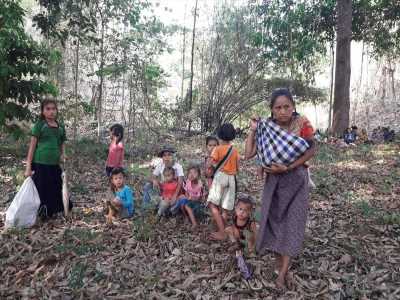
Outside pressure builds again on Myanmar junta as death toll tops 500
(Reuters) -Myanmar faced growing criticism on Tuesday over a surge in violence against opponents of military rule that killed more than 140 people in one day, with a new offer to help promote dialogue by neighbours alarmed by the crisis.
Myanmar has been in turmoil since the army ousted an elected government led by Nobel laureate Aung San Suu Kyi on Feb. 1, detaining her and reimposing military rule after a decade of tentative steps towards democracy.
At least 512 civilians had been killed in nearly two months of protests against the coup, 141 of them on Saturday, the bloodiest day of the unrest, according to the Assistance Association for Political Prisoners (AAPP) advocacy group.
Fighting has also flared in old wars between the Myanmar army and ethnic minority insurgents in frontier regions and refugees are beginning to spill over borders.
Western countries have condemned the coup and the violence and called for Suu Kyi’s release, and some have imposed limited sanctions.
Asian neighbours have been more guarded though Indonesia, Malaysia and Singapore have spoken out, and Indonesia did so again on Tuesday, while renewing an offer to help.
“Indonesia strongly denounces this kind of act. It is unacceptable,” its foreign minister, Retno Marsudi, said while on a visit to Japan, referring to the surge in violence.
Indonesia has led efforts by members of the 10-country Association of Southeast Asian Nations (ASEAN), of which Myanmar is a member, to encourage a negotiated solution, despite a bloc principle of not commenting on each other’s problems.
“While continuously respecting the non-interference principle, since the very beginning ASEAN offers is assistance to Myanmar,” Retno said.
Related Coverage
See more stories
She said the safety and well-being of the Myanmar people was paramount, adding: “Dialogue should be pursued to bring democracy, peace and stability back in Myanmar.”
The Philippines issued its strongest comment on the crisis, saying it was dismayed by the “excessive and needless” force against protesters.
“We reiterate our call for security forces in Myanmar to exercise restraint and desist from resorting to disproportionate force against unarmed citizens,” the Philippine foreign ministry said.
“We remain steadfast in supporting Myanmar on its path to a fuller democracy beginning with the immediate release of … Suu Kyi and duly-elected civilian leaders,” it said.
Thailand asked for the violence to be “reduced”.
A spokesman for the Myanmar junta did not answer calls seeking comment. Traditionally, foreign criticism and Western sanctions have failed to sway the generals.
‘UNFAIR’
Despite the surge in violence on the weekend, thousands of protesters came out to march in several towns on Tuesday, according to media and photos on social media.
Security forces shot and killed one man in the southernmost town of Kawthaung as they cleared the streets, the Mizzima news portal reported, and one person was killed in the northern town of Myitkyina, a relative of the 23-year-old victim told Reuters.
A civil disobedience campaign of strikes has paralysed parts of the economy and protesters stepped it up by asking residents to leave garbage at intersections in the main city of Yangon.
One of the main groups behind the protests, the General Strike Committee of Nationalities, called on Monday in an open letter for ethnic minority forces to help those standing up to the military’s “unfair oppression”.
In a sign the call may be gaining traction, three groups – the Myanmar National Democratic Alliance Army, the Arakan Army and Ta’ang National Liberation Army – urged the military to stop killing protesters and resolve political issues.
If not, they said they would cooperate with all ethnic groups “who are joining Myanmar’s spring revolution” to defend themselves.
Ethnic minority insurgents have battled the government for decades for greater autonomy. Though many have agreed to ceasefires, fighting has flared in recent days.
Military aircraft bombed ethnic Karen insurgents in the east on the weekend, sending some 3,000 villagers fleeing to neighbouring Thailand.
Thailand denied accusations from activists that refugees were being forced back but a Thai official on the border said the army was sending most people back because it was deemed safe on the Myanmar side.
Nevertheless, more than a dozen people were allowed to cross into Thailand on Tuesday for medical treatment, Reuters witnesses said.
A spokesman for the U.N. refugee agency said it was concerned about reports people were being sent back and it was seeking information from Thai authorities.
Fighting has also flared in the north where ethnic Kachin insurgents battle government forces. A border state in India withdrew an order to refuse refugees food and shelter after the measure drew fierce public criticism.
Myanmar’s military has for decades justified its grip on power by saying it is the only institution capable of preserving national unity.
It seized power saying that November elections won by Suu Kyi’s party were fraudulent, an assertion dismissed by the election commission.
Source: Read Full Article